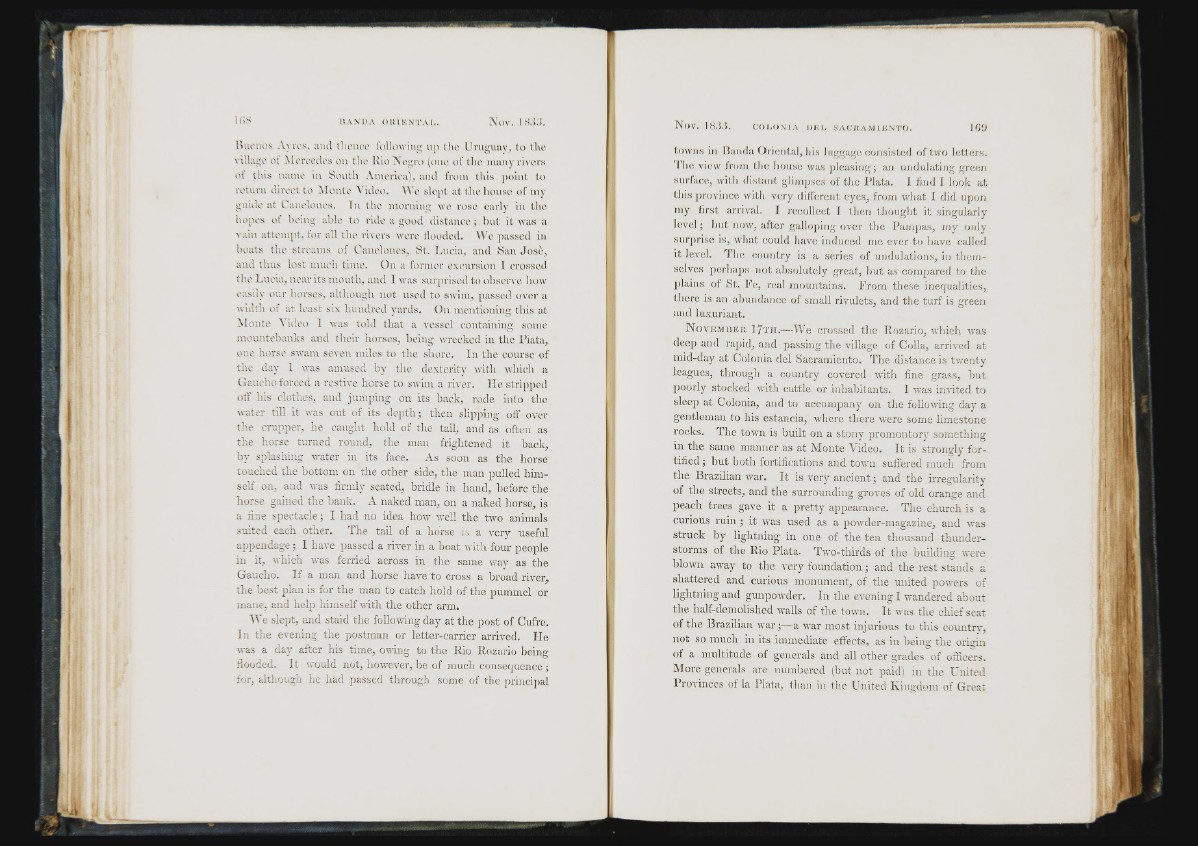
Buenos .Vyvos. and thonoo iollowiiig up Iho Uruguay, io (lu'
village ot Morooilos ou tlio Kio jSogro (one of llio many rivors
ot this uaiuo in South Amovioa'). and from this |)oiul l.o
roturu diroot to Monto 1 ideo. Wo slopt at tho luuiso of luy
guido at Oauolouos. In tho inorning wo roso oaily in Uic
liopos ot boing ablo to rido a good distaiuv ; but it was a,
vain attoiupt. for all tho rivors woro lloodod. \)'o passed in
boats the streams of Canolonos, St. laioia, and San .lose,
and thus lost luuoli time. On a former oxoursion 1 orosscd
tho Lucia, near Its mouth, and 1 was surprised to ol)sor\'C how
easily our horses, although not used to swim, passed over a
W'idth of at least six hundred yards. On mentioning this at
.Monte A ideo 1 was told that a vessel ooutainiiig some
mountebanks and their liorses, being wrecked in the Plata,
one horse swimi seven miles to the shore. In tlie course of
the day I was amused by the dexterity with which a
Gaucho forced a restive horse to swim a river. He stripped
off his clothes, and jumping on its back, rode into the
water till it was out of its depth; then slipping off over
the crupper, he caught hold of the tail, and as often as
tlie horse turned round, the man frightened it back,
by splashing water in its face. As soon as the horse
touched the bottom on the other side, the man pulled himself
on, and was firmly seated, bridle in hand, before the
horse gained the bank. A naked man, on a naked horse, is
a fine spectacle; I had no idea how well the two animals
suited each other. The tail of a horse is a very useful
appendage ; I have passed a river in a boat with four people
in it, which was ferried across in the same way as the
Gaucho. If a man and horse have to cross a broad river,
the best plan is for the man to catch hold of the pummel or
mane, and help himself with the other arm.
AVe slept, and staid the foUoiring day at the post of Cufre.
In the evening the postman or letter-carrier arrived. He
was a day after hi.s time, owing to the Rio Rozario being
flooded. It would not, however, be of much consequence ;
for. although he had passed through some of the principal
I.OVVILS ill Ban d a Or ie n ta l , liis luggage, eoiis isted of two le t te r s .
'I'lie view rrom th e h ous e was ) ) leas iiig; an u n d u la t in g gre en
siirhi.ee, with d i s ta n t gl imp s e s of th e I ’la ta . I find 1 look a t
t in s p n iv in e e with ve ry (lifferent eyes , f rom w h a t 1 did u p o n
niy l i r s t a r r ival. I re co l le c t I th e n t h o u g h t it s in g u la r ly
le v e l ; h u t now, a l te r g a l lo p in g o v e r th e I’am|)a s , m y o n ly
s u rp r i s e is, wh a t could have in d u c e d rnc e v e r to h av e called
i t level. 'I 'he eouni.ry is a scr ies of undulation.s, in t h em selves
p e r l iap s n o t a b so lu t e ly g re a t , b u t as c omp a r e d to th e
)>laiiis ot St . Re, real m o u n ta in s . F r om th e s e in eq u a l i t ie s ,
th e r e is an a lmn d a n co o f smal l r ivule ts , a n d th e t u r f is g re e n
a n d lu x u r ian t .
NovEMiiEii l7'rn.— We crossed the Rozario, which was
deep and rapid, and passing the village of Colla, arrived at
mid-day at Colonia del Sacramiento. The distance is twenty
leagues, through a country covered with fine grass, but
poorly stocked with cattle or inliabitants. I was invited to
sleep at Colonia, and to accompany on the following day a
gentleman to his estancia, where there were some limestone
rocks. The town is built on a stony promontory something
in the same manner as at Monte A’ideo. It is strongly fortified
; but both fortifications and town suffered much from
the Brazilian war. It is very ancient; and the irregularity
of the streets, and the surrounding groves of old orange and
peach trees gave it a pretty appearance. The church is a
curious ruin ; it was used as a powder-magazine, and was
struck by lightning in one of the ten thousand thunderstorms
of the Rio Plata. Two-thirds of the building were
blown away to the very foundation; and the rest stands a
shattered and curious monument, of the united jjowers of
lightning and gunpowder. In the evening I wandered about
the half-demolished walls of the town. It was the chief seat
of the Brazilian war;—a war most injurious to this country,
not so much in its immediate effects, as in being the origin
of a multitude of generals and all other grades of officers.
More generals are numbered (but not paid) in the United
Provinces of la Plata, than in the Lnited Kingdom of Great